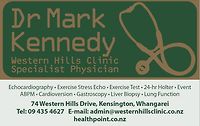Dr Mark Kennedy
Western Hills Clinic
74 Western Hills Drive
Kensington
Whangarei 0112

www.healthpoint.co.nz
Dr Mark Kennedy - Private Internal Medicine Specialist

Postal Address
Contact Details
Phone (09) 435 4627, or if URGENT, Linda Clinical Nurse Specialist 021 689 447 outside of clinic hours
Mobile Emergency Phone (021) 702 395
Email admin@westernhillsclinic.co.nz
Healthlink EDI: west74hc
For any urgent Echocardiogram, Exercise Stress Echocardiogram or Exercise Tolerance Test, contact Clinical Nurse Specialist (Linda) on (09) 435 4627 on Tuesday and Thursday (or 021 689 447 outside those days). If she is unavailable and it is URGENT, call Mark Kennedy on (021) 702 395. We can undertake Transthoracic Echocardiograms most weekdays.
Coronary Artery Disease
Patient information:
This refers to narrowing of the arteries that supply blood to the heart muscle. The heart, like all other organs in the body, needs a constant supply of oxygen and energy. Narrowed arteries are unable to keep up with the demand needed to supply the heart muscle with blood and oxygen. A coronary artery narrowing (stenosis) or obstruction can cause damage to the heart muscle.
The most common symptom of this problem is chest pain or tightness that occurs when you exert yourself (angina). Typical angina chest pain is a heavy sensation in your chest associated with shortness of breath. The pain sometimes radiates to your arms and can make you feel nauseated, breathless, dizzy or sweaty. Not everybody experiences the same sensation and any one of those symptoms can represent angina. If your GP thinks you may have angina, they will refer you for an assessment to plan treatment.
Heart Attack (Myocardial Infarction)
If an attack of chest pain lasts for more than 20 minutes, then you may be having a heart attack. This is when a piece of the heart muscle has been deprived of oxygen for so long that it can be permanently damaged, in some cases causing death. There are treatments available in hospital that can prevent heart attacks and save lives, so if you have chest pain or symptoms of chest pain that last for more than 20 minutes, you should call an ambulance and be taken to hospital as soon as possible.
Am I likely to have coronary artery disease?
There are several risk factors that are proven to be associated with this disease. Even if you don’t have any of the following, it could still happen to you.
You are more likely to have coronary artery disease if you have any of the following:
- Are or have been a smoker
- Diabetes
- High blood pressure (hypertension)
- High cholesterol
- A family history of coronary artery disease
- Are older (your risk increases as you get older)
Treatment consists of medications to protect the heart and its blood vessels. These include Aspirin which makes the blood less sticky and prone to clots, medication to lower your cholesterol (even if it isn’t very high this is still helpful), medication to make your heart beat more slowly and to open the blood vessels. You will be given a Glyceryl Trinitrate (GTN) spray to carry with you with instructions of what to do if you have angina.
You will be given advice on dietary changes that can protect the heart as well as stop smoking programmes.
If you have had a heart attack you will be offered cardiac rehabilitation classes with a Specialist Cardiac Rehabilitation Nurse.
Depending on test results, you may be offered procedures to either percutaneously (through the skin) or surgically correct the narrowed coronary arteries.
https://www.healthpoint.co.nz/private/internal-medicine/dr-mark-kennedy-private-internal-medicine/